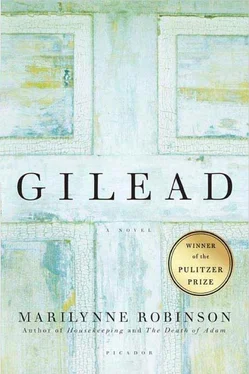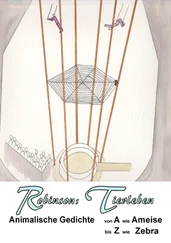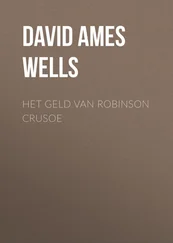My father was telling himself and all the rest of us that Edward’s transgressions were trivial beside his own. He was also saying, to himself and to the rest of us, that there was an aptness in this present embarrassment and disappointment which made it valuable and instructive to him — that there was a seeming ^design in it that might mark it in fact as the Lord’s benevolence, a sort of parable meant to deepen his own understanding. This construction of the matter would certainly have forbidden, or at least discouraged, any impulse he might have felt to blame Edward. The thoughtlessness of any individual, when it is seen to be in service to the mindfulness of the Lord, cannot justify anger.
I have used this line of reasoning any number of times myself, when I have felt the need and found the occasion. And the fact is, it is seldom indeed that any wrong one suffers is not thoroughly foreshadowed by wrongs one has done. That said, it has never been clear to me how much this realization helps when it comes to the practical difficulty of controlling anger. Nor have I found any way to apply it to present circumstance, though I have not yet abandoned the effort.
***
This afternoon I came back from a fairly discouraging meeting at the church — just a few people came, and absolutely nothing was accomplished. That is the kind of thing that wears me out. So I took a nap and slept through supper. It was dark when I woke up and the house was empty so I went out to the porch. You and your mother were sitting on the swing, wrapped up in a quilt. She said, “This might be the last mild night.” She made room for me beside her and spread the quilt across my lap and rested her head on my shoulder. It was just as pleasant as could be. This summer she planted what she calls her owl garden, I being the owl in question. She read somewhere that white flowers are most fragrant at night, so she planted every white flower she could think of along the front walk. Now there are just a few roses left, and alyssum and petunias.
So we sat there in the dark together for a while, you asleep, more or less, with your mother stroking your hair. Then we heard footsteps in the road. And sure enough, it was lack Boughton. I believe he may have meant to say good evening and pass by, but your mother asked him to come visit a little, so he did. He came in the gate and sat down on the steps. I have noticed that toward her he is consistently obliging.
“We were just enjoying the quiet,” she said.
He said, “No better place in the world to do that.” Then, as though he was afraid he might be misunderstood, or at any rate that he might give offense, he said, “It really is good to be back for a while.” He laughed. “There are people here now who don’t know me from Adam. It’s wonderful.”
Then he put his hand to his face, his eyes. It was dark, but I could recognize that gesture. He has made it his whole life, I believe.
I said, “It has been a great happiness to your father, having you here.”
He said, “The man’s a saint.”
“That might be true, but it was still good of you to come.” “Ah,” he said, as a man might when a chasm has opened at his feet.
So there was a silence of a few minutes, and then your mother stood up and lifted you out of the quilt and carried you away to bed.
“I have been glad to see you, too,” I said, because I really was, for old Boughton’s sake.
To that he made no reply. “I say that quite sincerely.”
He stretched out his legs and leaned back against the porch pillar.
“No doubt,” he said. “Stack of Bibles.”
He laughed. “How high?” “A cubit or so.”
“That’ll do, I guess.”
“Would two cubits put your mind at ease?”
“Entirely.” And then, remembering his manners, “It has been good seeing you again. And meeting your wife. Your famiiy—” Then we were quiet for a while.
I said, “I’m impressed that you know Karl Barth.” “Oh,” he said. “From time to time I still try to crack the code.”
“Well,” I said, “I admire your tenacity.”
He said, “You might not, if you understood my motives.” Of all people on this earth he must be the hardest one to have a conversation with.
So I said, “That’s all right, I admire it anyway.” And he said, “Thanks.”
So we were just quiet there for some time. Your mother came out with a pot of hot cider and cups, and she sat there quiet right along with us, the dear woman. And I spent the time thinking how it would be if Jack Boughton were indeed my son, and had come home weary from whatever life he had, and was sitting there still and at seeming peace in that peaceful night. There was a considerable satisfaction in that thought. The idea of grace had been so much on my mind, grace as a sort of ecstatic fire that takes things down to essentials. There in the dark and the quiet I felt I could forget all the tedious particulars and just feel the presence of his mortal and immortal being. And a sensation came over me, a sort of lovely fear, that made me think of Boughton’s fear of angels. Now, I may have been more than half asleep at that point, but a thought arose that abides with me. I wished I could sit at the feet of that eternal soul and learn. He did then seem to me the angel of himself, brooding over the mysteries his mortal life describes, the deep things of man. And of course that is exactly what he is. “For who among men knoweth the things of a man, save the spirit of the man, which is in him?” In every important way we are such secrets from each other, and I do believe that there is a separate language in each of us, also a separate aesthetics and a separate jurisprudence. Every single one of us is a little civilization built on the ruins of any number of preceding civilizations, but with our own variant notions of what is beautiful and what is acceptable — which, I hasten to add, we generally do not satisfy and by which we struggle to live. We take fortuitous resemblances among us to be actual likeness, because those around us have also fallen heir to the same customs, trade in the same coin, acknowledge, more or less, the same notions of decency and sanity. But all that really just allows us to coexist with the inviolable, untraversable, and utterly vast spaces between us.
Maybe I should have said we are like planets. But then I would have lost some of the point of saying that we are like civilizations. The planets may all have been sloughed from the same star, but still the historical dimension is missing from that simile, and it is true that we all do live in the ruins of the lives of other generations, so there is a seeming continuity which is important because it deceives us. I am old enough to remember when we used to go out in the brush, a lot of us, and spread out in a circle, and then close in, scaring the rabbits along in front of us, till they were trapped there in the center, and then we would kill them with sticks and clubs. That was during the Depression, and people were hungry, and we did what we could. I am not finding fault. (We didn’t take the jackrabbits, only the cottontails. We all knew there was something objectionable about jackrabbits, though I don’t remember anyone saying just what it was.) There were people eating groundhogs. The children would go to school with nothing in their lunch buckets but a boiled potato or a scrap of bread with lard smeared on it. In those days the windows of the church used to get so pelted with dust that I’d get up on a ladder and sweep them down with a broom so there would be light enough inside for people to read their hymnals.
The times were dreadful, but it was just how it was, and we got very used to it. That was our civilization. The valley of the shadow. And it might as well be Ur of the Chaldees for all people know about it now. For which I thank God, of course, though, since it had to happen, I don’t regret having been here for it. It gives you another look at things. I have heard people say it taught them there is more to life than security and the material comforts, but I know a lot of older people around here who can hardly bear to part with a nickel, remembering those hard times. I can’t blame them for it, though it has meant that the church is just now beginning to come out of its own Depression. “There is that scattereth, and increaseth yet more, and there is that withholdeth more than is meet, but it tendeth only to want.” Much in this very town proves the truth of that proverb. Well, the church is shabby for the same reason it’s still standing at all. So I shouldn’t really complain. It is a good thing to know what it is to be poor, and a better thing if you can do it in company.
Читать дальше












